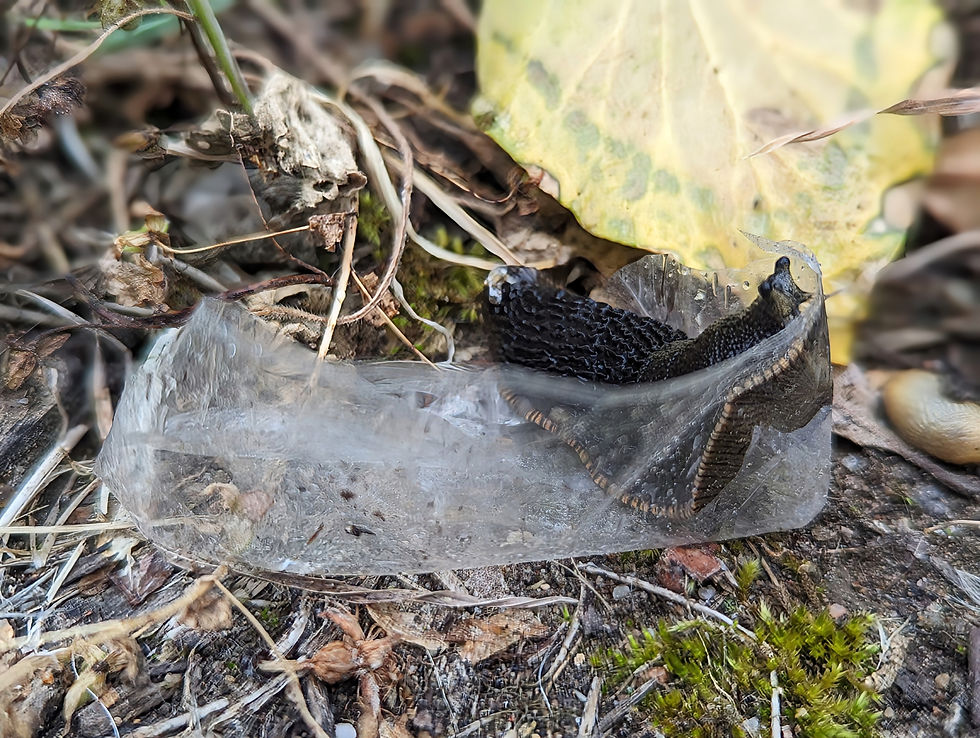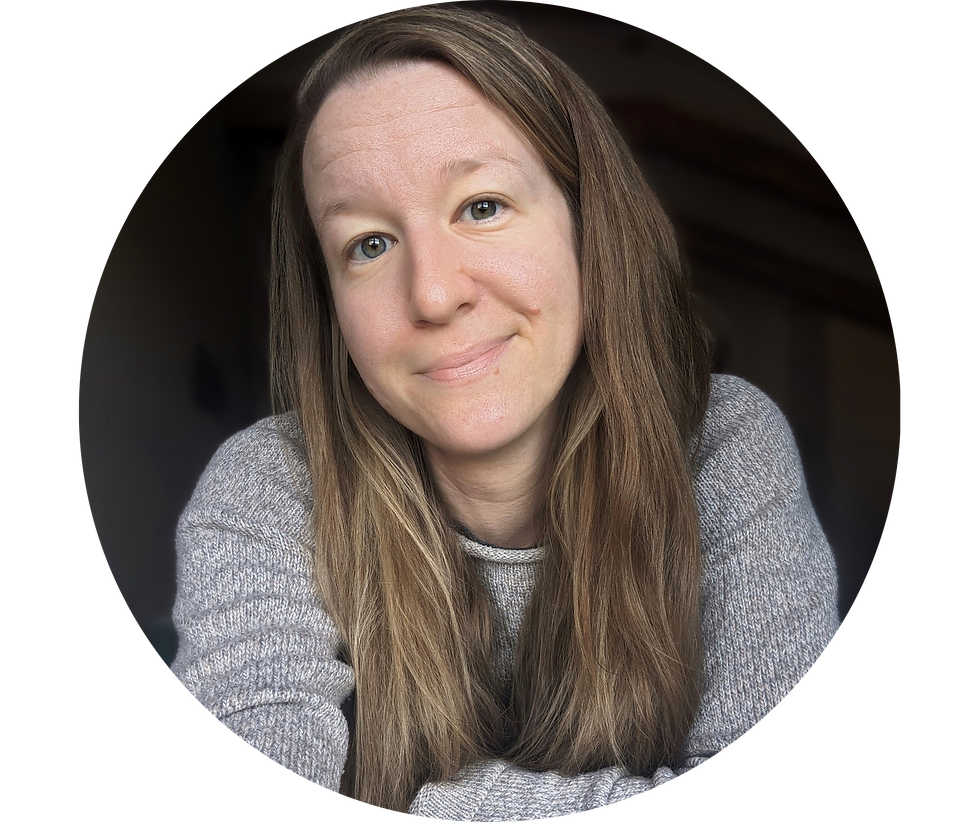Pilgrim Trash, Mindfulness, and an Invitation
- Katie Allen

- May 10, 2024
- 7 min read
I made something. Look closely. It might not be what you think at first glance:

This little art project represents just a fragment of two grocery bags of trash I collected from the Camino a few days ago. I picked up pilgrim garbage for about 30 minutes on a short stretch of one road in Rabanal. I couldn’t believe how much there was, especially considering I’d just done the same thing a couple of weeks ago in the same place.
I had just spent the past 2 months in the village at The Stone Boat working on my next book. As I prepared to leave, I wanted to show my gratitude for all this place and a few sweet souls (and cats) had done for me since it was a time of deep and challenging work. I’d walked the French Way last summer and now felt both gratitude and a kind of devotion to the Camino for being a place where I could work through what I needed to tend to but had avoided fully facing. I’d just been held by the Camino again, but in a different way. I had returned not to walk, but to complete the other side of my pilgrimage through writing.
On that second clean-up, I remember how irritated I was getting as I stopped every few feet to pick up another wrapper or cigarette butt or tissue (so. many. tissues). As new pilgrims passed me, I noticed the warm feelings I’d had toward them until now were shifting to something else, to judgment, really, though as far as I knew, they’d never dropped a piece of trash in their lives.
When I’d barely gone a few hundred meters and already filled up a bag, I started getting grumpier and grumpier. Wasn’t this supposed to be a simple act of gratitude that made me feel better, not worse? Should I just leave all this trash so that the pilgrims themselves see what they’re doing to the Camino, which might force them to behave better?
My mind flashed back to the other day when I’d cut up a few of the poems that Kim, the owner of The Stone Boat, had kindly compiled for pilgrims that go in a tin that has “take one” painted on the lid. Through the window, I’d witnessed over a hundred pilgrims take out a poem, smile, and tuck it away before carrying on. I’d done the same when I’d passed through here, and it was a gift to have a few profound words to muse on while walking.
So when I took out those slips of paper to replenish the now-empty tin, I was shocked when I opened it and I found it was already full—of two empty juice boxes wedged inside.

This thought triggered others. On an evening walk around the village, I’d not only found a bag and wrappers shoved into different stone walls along the trail, but also a pilgrim’s trash from a picnic pushed into a hole in the very same table where they’d enjoyed their meal. It was just 30 or so feet away from a trash can.
Anger, like other strong emotions, can act like fire, burning through us until we’re smoldering and can’t see through the haze. Another thought catches, then another. And if we’re not aware of what’s happening because of how all-consuming it feels, it’s like a strong wind picks up, and our insides get devoured.
Back on the trail and crouched down with a full bag on my arm, my mind had turned to embers. As smoke poured out of my ears, I picked up yet another rain-soaked piece of paper, shaking my head. How can people be so thoughtless? I burned.
Except, wait a second…
With horror, I realized that it was a poem that I had put in the tin can, which had blown over several times in the wind over the past month. On one of those occasions, the lid had come off and— somewhat poetically— all the poems blew across the Camino. When I heard it rolling around outside, I’d chased them down as best I could, stuffing them back into the tin and then putting rocks inside to weigh it down. But the fact remained that I was the reason this trash was here.

As I held that soggy piece of paper in my hands that I’d unknowingly contributed to the mess, it got me thinking.
Things aren’t always what they appear. We reach into our pockets for a tissue, but a cough drop wrapper comes out with it, flying behind us as we keep our brisk paces, unaware. We finish a snack and shove the wrapper into our bags and a piece of it falls on the ground, but we’re only looking forward, maybe plugged in and distracted. We put poetry in a tin with a hope that they’ll brighten a pilgrim’s day, but the wind knocks it over and blows it into a puddle.
I believe that more pilgrims than not try their best and that much of the trash I collected came to me by accident in some way. But thoughtlessness is also a common cause, like not checking our surroundings before moving on, and sometimes, pilgrims do it downright intentionally.
For the most part, a lot of this boils down to a simple lack of awareness.
No matter what calls us to the Camino, I believe it’s the ultimate invitation to practice mindfulness. By this, I simply mean a way to learn how to pay attention again to the neglected parts of ourselves and the world: our hearts, our minds, our spirits, and our surroundings—including our trash.
This beautiful, ancient trail has been traversed by millions of our grieving and lost and hopeful ancestors and fellow human beings for over a thousand years. So it makes sense that when we see litter or other “bad pilgrim” behavior, we feel annoyed, frustrated, or even angry. Like I did.
There won’t always be a soggy poem to snap us out of our hazy, judgmental trances, though such lessons certainly litter our lives, and we’d be wise to learn from them. Thankfully, it doesn’t take a piece of trash or any tangible thing outside of us to strengthen our ability to practice more conscious living; we have plenty of thoughts, emotions, and felt experiences within us to work with, like that swirly anger I’d gotten caught up in.
What I’m trying to get at is: what if we took the opportunity to practice simply noticing such strong reactions when they arose?
What if, instead of unconsciously clinging to them and letting them grow and fester and take us away from the moment, we saw them as an invitation to practice mindfulness? Wouldn’t that be a more skillful way to grow on your pilgrimage? To respond more wisely and less reactively to one of the many situations along the Camino that is sure to push you to your limits? To not immediately jump to judgment, as I did? (I’m a big meditator myself and still get caught up in strong emotions sometimes— that’s why it’s called a practice and not just a lesson we learn once and are done with.)
This way of being is not excusing thoughtless acts or inconsiderate behavior like leaving behind soiled toilet paper (search “Leave No Trace” to learn more if this is a new concept for you). Rather, it’s an invitation for all of us to strengthen the “muscle” or habit of awareness that will allow us to respond more wisely instead of on autopilot. I believe such a collective effort will not only result in less trash on the Camino, but less unconscious behavior in general, both on the Way and in the rest of our lives.
We might not have a choice in something that’s happened but which affects us, but we do have a choice in how we respond. We can either do so unconsciously and strengthen that habit of living on autopilot, or, with mindfulness, we can notice what’s happening, pause, and choose a wiser response. By the end of a million steps, or however many you walk, imagine how much we will have improved our ability to notice the world around us and be less reactive and more considerate beings.
Mindful practices also help remind us just how deeply connected we all are, an awareness that would directly translate to better stewardship of the Camino. Rather than shoving an empty bag into the crevice of that picnic table because you don’t think it’s that big of a deal, those practicing mindfulness will be more inclined to consider the others with whom you are sharing the path, perhaps even resulting in picking up a piece of trash that’s not yours. Imagine if we all did this once or twice a day; we’d likely have a trash-free Camino. I know this slug would appreciate it:

There are so many ways to pay attention, to notice, to be more aware of what’s in front of us (and behind us). Mindfulness includes practices connected to our breath, body, thoughts, emotions, and loving-kindness (metta). And it's one of the greatest invitations that the Camino offers us if we're only willing to accept it.
I’m curious about how you might find ways to practice along your Camino. Perhaps each time we reach for that tissue or snack, that’s the signal to do a quick check to our left or right, maybe behind us. Or if we see a wrapper fly out of a pocket and think “oh, but it’s so small,” we remember that a million others are walking that year, and that those small things add up. So, we pause and turn around and take a moment to go grab it, which also models good behavior for others passing us, too. If they’re too bound up in their mind like I was that day collecting trash, seeing you pick something up could be the equivalent to me discovering my own poetic contribution to the garbage problem. You might be their invitation to mindfulness that day, and so the ripple effect will spread.
By practicing mindfulness, we will not only reduce the amount of trash and judgment that is lining this sacred path, but we will also become more open and loving and receptive to all the Way has to offer both on and off the trail.
But we must pay attention first.
What do you think? Let me know if you agree, and tell me about your experiences walking the Camino and any other advice you might have around this topic.
Finally, if you’d like to learn more and try some of these practices before (or after) your Camino, I host a few offerings that include meditation, writing, and reading. You can find everything over at my little Camino Corner, and the next Pre-Departure Meditation is coming up in June:
Buen Camino, and take good care,
Katie
PS: Want to get involved in cleanup and other Camino efforts? Head over to Peaceable Projects to learn more.

Subscribe to receive my monthly newsletter and other updates about writing, reading, and pilgrimage.












Commentaires